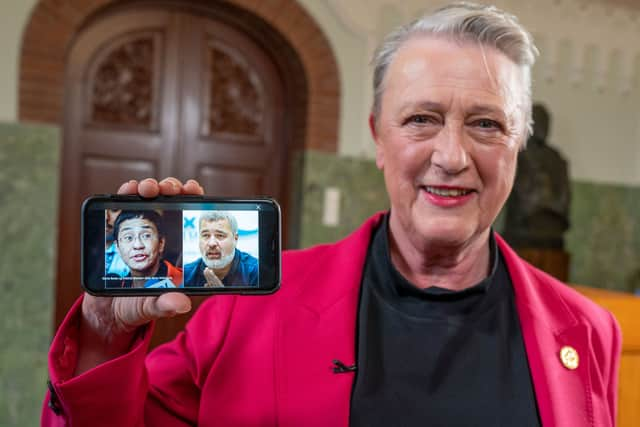Nobel Peace Prize 2021: who are winners Maria Ressa and Dmitry Muratov, and what prize money do they win?
This year’s Nobel Peace Prize has been awarded to two journalists for their work to defend the freedom of expression.
Maria Ressa of the Philippines and Dmitry Muratov of Russia were announced as the winners by the Nobel committee in Oslo, Norway.
Advertisement
Hide AdAdvertisement
Hide AdThe committee said the pair were worthy of the award because of their: “courageous fight for freedom of expression in the Philippines and Russia.”
Muratov and Ressa, who were chosen out of 329 candidates, will each receive a half share of the prize which is worth 10 million Swedish Krona.
Here’s what you need to know about them and why they won.
Who are Maria Ressa and Dmitry Muratov?
Maria Ressa is a journalist and author and co-founder and CEO of newsite Rappler. She was born in Manila in 1963, and spent almost two decades as a lead investigative reporter in Southeast Asia for CNN.
She was included in Time’s Person of the Year 2018 as part of a group of journalists tackling fake news. She is a critic of Rodrigo Duarte, President of the Phillipines.
Advertisement
Hide AdAdvertisement
Hide AdDmitry Muratov was born in 1961 in Kuybyshev, which is now called Samara, he is a Russian journalist and editor-in-chief of Novaya Gazeta. He edited the newspaper between 1995 and 2017, however he returned to the title in 2019.
The newspaper is known for reporting on governmental corruption and human rights violations.
What did Maria Ressa do?
The Nobel committee awarded her the peace prize because of her work to expose abuses of power as well as defending freedom of expression.
In a statement the committee said of Ressa: “Maria Ressa uses freedom of expression to expose abuse of power, use of violence and growing authoritarianism in her native country, the Philippines.
Advertisement
Hide AdAdvertisement
Hide Ad“In 2012, she co-founded Rappler, a digital media company for investigative journalism, which she still heads. As a journalist and the Rappler’s CEO, Ressa has shown herself to be a fearless defender of freedom of expression. Rappler has focused critical attention on the Duterte regime’s controversial, murderous anti-drug campaign.
“The number of deaths is so high that the campaign resembles a war waged against the country’s own population. Ms Ressa and Rappler have also documented how social media is being used to spread fake news, harass opponents and manipulate public discourse.”
In a recorded call from the Nobel Committee telling her she had won, Ressa said: “I’m speechless!”
Why did the committee select Dmitry Muratov?
Muratov’s work has been praised for defending freedom of speech in Russia under “increasingly challenging conditions.” In 1993, he was one of the founders of the independent newspaper Novaja Gazeta.
Advertisement
Hide AdAdvertisement
Hide AdSince 1995 he has been the newspaper’s editor-in-chief for a total of 24 years. The title the most independent newspaper in Russia today, with a fundamentally critical attitude towards power.
The committee said: “The newspaper’s fact-based journalism and professional integrity have made it an important source of information on censurable aspects of Russian society rarely mentioned by other media. Since its start-up in 1993, Novaja Gazeta has published critical articles on subjects ranging from corruption, police violence, unlawful arrests, electoral fraud and ”troll factories” to the use of Russian military forces both within and outside Russia.
“Novaja Gazeta’s opponents have responded with harassment, threats, violence and murder. Since the newspaper’s start, six of its journalists have been killed, including Anna Politkovskaja who wrote revealing articles on the war in Chechnya. Despite the killings and threats, editor-in-chief Muratov has refused to abandon the newspaper’s independent policy. He has consistently defended the right of journalists to write anything they want about whatever they want, as long as they comply with the professional and ethical standards of journalism.”


What is the Nobel Peace Prize?
The Nobel Peace Prize is one of the five Nobel Prizes established by the will of Swedish industrialist, inventor, and armaments (military weapons and equipment) manufacturer Alfred Nobel.
Advertisement
Hide AdAdvertisement
Hide AdOn 27 November 1895, Alfred Nobel signed his last will and testament, giving the largest share of his fortune to a series of prizes in physics, chemistry, physiology or medicine, literature and peace – the Nobel Prizes. In 1968 a prize in economic sciences was established by Sweden’s central back in memory of Nobel.
Between 1901 and 2020, the Nobel Prizes and the prize in economic sciences were awarded 603 times.
Maria Ressa and Dmitry Muratov join the ranks of previous Nobel Peace Prize winners which include Martin Luther King Jr, 1964, Mother Theresa, 1979 and Malala Yousafzai, 2014.
We want to hear from you: let us know what you think about this story and be part of the debate in our comments section below
A message from the editor:
Advertisement
Hide AdAdvertisement
Hide AdThank you for reading. NationalWorld is a new national news brand, produced by a team of journalists, editors, video producers and designers who live and work across the UK. Find out more about who’s who in the team, and our editorial values. We want to start a community among our readers, so please follow us on Facebook, Twitter and Instagram, and keep the conversation going. You can also sign up to our email newsletters and get a curated selection of our best reads to your inbox every day.
Comment Guidelines
National World encourages reader discussion on our stories. User feedback, insights and back-and-forth exchanges add a rich layer of context to reporting. Please review our Community Guidelines before commenting.